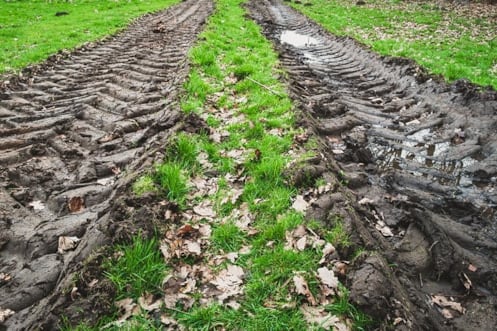The Farmers’ Union of Wales has highlighted the challenges farmers are facing due to the wet weather and called for possible interventions.
The call came during a summit which took place on Friday, April 19.
Organised by Cabinet Secretary for Climate Change and Rural Affairs, Huw Irranca-Davies MS, the summit was arranged to examine the impacts of the current prolonged wet weather and to explore what interventions may be necessary from the supply chain to deal with the exceptional circumstances some farmers are facing.
Wales has been subjected to a prolonged period of very wet weather. In February, Wales received 187.5 per cent of the rainfall compared to the long-term average (1981-2010).
Weather and ground conditions for lambing are extremely challenging and compounded by the impact of continuous wet weather on ewe condition. Lambing losses are, therefore, higher than normal and feeding ewes and creep feeding of lambs is proving problematic, due to ground conditions, and costly.
NFU Cymru says it are aware of examples of away wintered sheep having to be brought home earlier than usual because their tack ground was flooded/ground conditions are no longer appropriate. This is adding to pressure on the home farm.
Ground and weather conditions prevented autumn planting on many Welsh farms. What has been sown will need to be resown in full or parts of fields.
Other widespread effects on agriculture caused by the weather including calving, delayed turn-out, disease pressure, slurry/manure storage, root crops.
As well as a myriad of other issues, the wet weather is also adding to the levels of stress and anxiety experienced by many within the farming community.
Speaking after the summit, FUW President, Ian Rickman said: “We welcome the opportunity to discuss these very timely issues farmers face following an extremely wet winter. It was positive to see engagement from such a wide range of stakeholders from across the UK food supply chain.
“Some of the interventions we called for included derogations around scheme requirements; many Growing for the Environment contract holders have simply been unable to meet the required sowing dates due to the wet conditions. It’s been impossible for some farmers to comply with their Small Grants Environment contracts due to both the weather and prescriptive dates for when certain works could be completed.”
Other interventions required, in the FUW’s view, include greater flexibility to cross compliance rules and farm inspections. Additionally there is an urgent need to provide capital grant support to farmers for slurry infrastructure and yard coverings in line with reducing the burden on those who are attempting to complete works to meet incoming regulatory requirements.
Mr Rickman added: “Despite numerous calls made by the FUW to delay the third phase of the Control of Agricultural Pollution ‘NVZ’ regulations until the review of the regulations has been completed, this latest edition of wet weather has made it impossible for building contractors to continue with their work. This means that the August deadline for increased slurry storage is looking as challenging as ever
“Above all else, these past few months have demonstrated the need for any future financial support scheme in Wales to underpin the economic viability of our family farms so that they can continue to navigate such unforeseen circumstances in future.
“Whilst we await news from the Welsh Government on outcomes from the summit, it is recommended for any farmer facing extreme difficulties to seek support and speak with relevant organisations. These include the FUW, Rural Payments Wales, Natural Resources Wales, bank managers, The DPJ Foundation or any other mental health charities. No one should feel alone during these trying times, we’re all here to support one another.”





Comments
This article has no comments yet. Be the first to leave a comment.